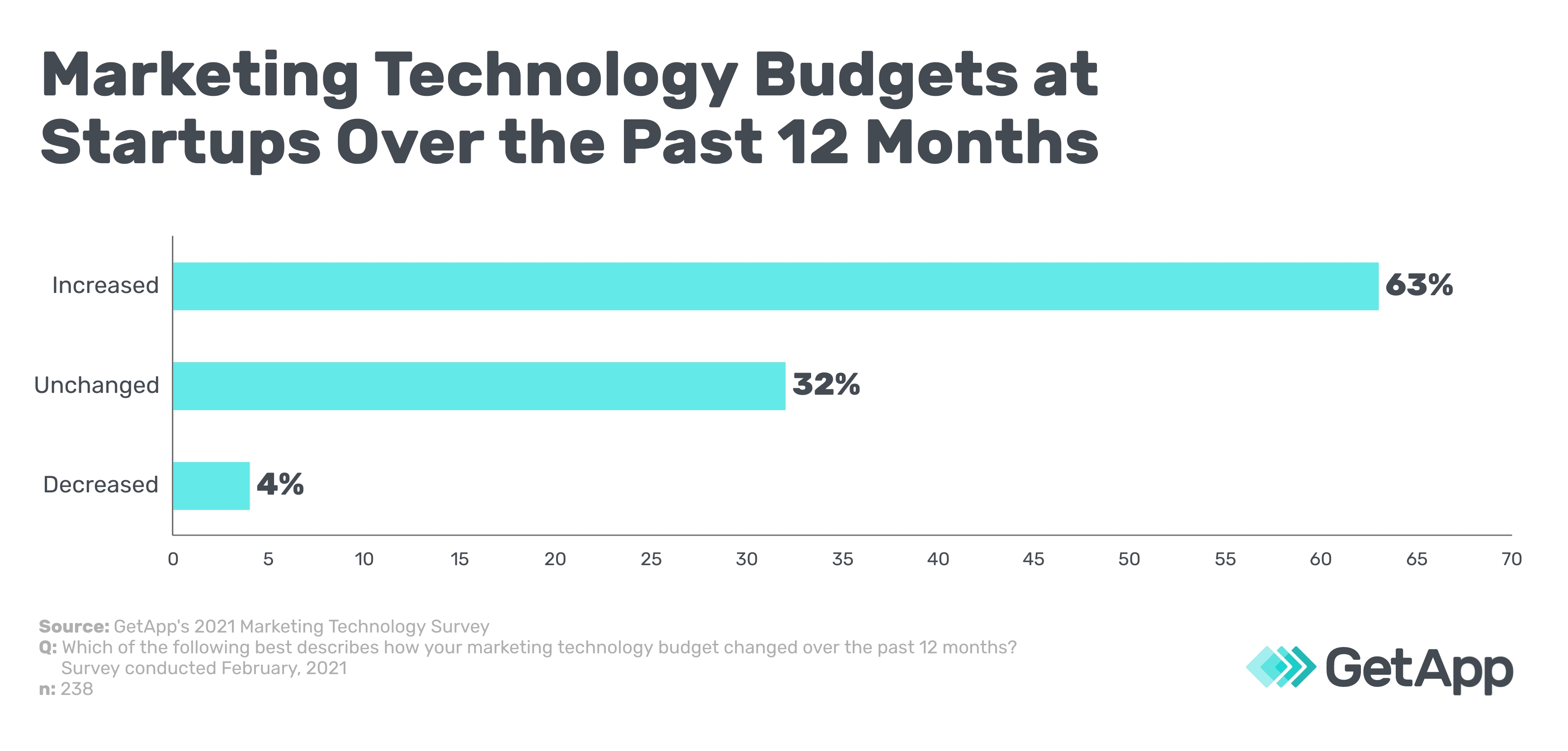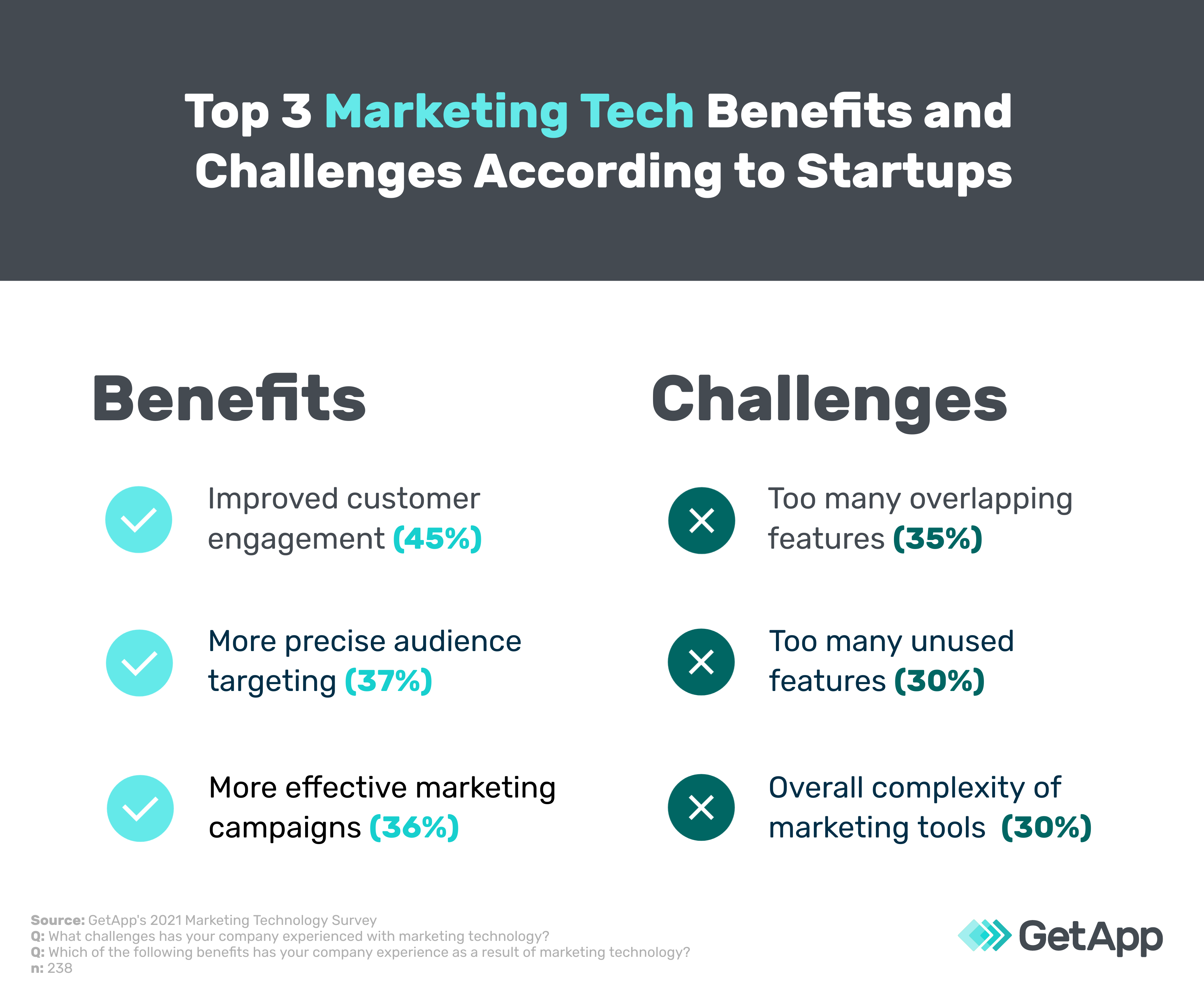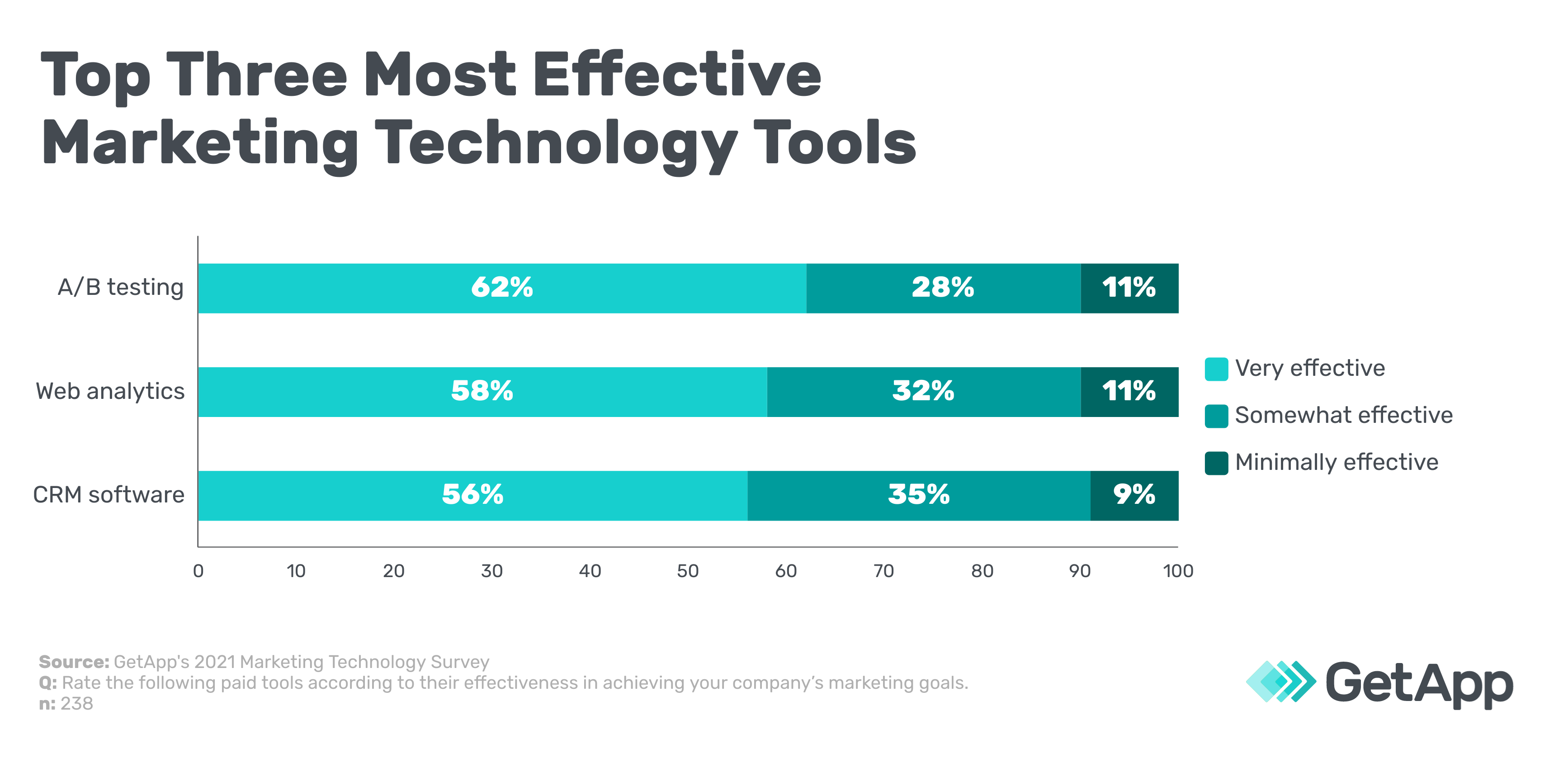Startups Are Adopting Marketing Technology in Droves—But How Effective Are Their Stacks?
Startups need marketing technology to plan, track, and optimize digital marketing efforts. But the dizzying array of options can complicate the development of an effective marketing technology stack.
Most startups are small. But when people hear the word startup they often think of unicorn companies with virtually unlimited resources. According to LinkedIn, a startup can have thousands of employees and hundreds of millions in funding. Fair enough, but most startups aren’t household names like DoorDash or Robinhood, yet.
We asked Startup Grind, the world’s largest online startup community, about their membership demographics. They told us that 79% of their members are companies with fewer than 10 employees, 77% have less than $500,000 in funding, and nearly two thirds (64%) pull in $50,000 or less in annual revenue.
According to those numbers, the vast majority of startups do not have unlimited resources. With that in mind, we asked Startup Grind members about their most pressing technical challenges. The two top responses were building an effective online presence and identifying software that solves the desired problem.
That's why we’ve focused this piece on the effective deployment of marketing technology (commonly referred to as martech), to help startups like yours make the most of their marketing resources and tackle those challenges head on.
68% of startups use marketing technology tools—but too few have a plan for them
According to our recent survey, a full 68% of startups use marketing technology tools (you can find our survey methodology at the bottom of this page). Of those startups that don’t use marketing technology, more than half enlist an outside marketing agency for some or all of their needs.
When startups that use martech tools were asked if they've developed and closely followed a plan for their marketing technology, 59% agree and 41% disagree. That’s a problem, because respondents whose startups don’t have a plan for marketing technology are more than four times as likely to say their marketing technology does not meet their business objectives.
These survey results suggest that getting the most from your marketing technology takes a fairly simple approach: have a plan for its use and follow through with it. You can use our five-step guide to creating a marketing technology plan to do just that:
5-step guide to creating a marketing technology plan
Step #1: Assemble your team
Form a cross-functional team of decision-makers and end users from across your business, each with clearly defined roles for developing your marketing technology plan. Set aside time for team members to research and understand the marketing technology landscape prior to the first meeting.
Step #2: Identify required capabilities
Consider the capabilities required to support digital marketing initiatives. Determine which tools you need and how they will be integrated. Identify what data will be required and how it will be collected, managed, and protected.
Step #3: Set implementation timeline
Develop an implementation timeline using your preferred project management methodology (e.g., Gantt chart). Sequence your marketing technology rollout based on business priorities and interdependence among tools.
Step #4 Visualize and communicate
Whether you decide to build a detailed roadmap or a design a simple infographic, it’s crucial that you visualize your plan, ensure it’s easy to understand, and distribute it to stakeholders. Share updates on the plan's progress and communicate any changes to roles, responsibilities, or the plan itself.
Step #5: Review performance
Review your marketing technology capabilities every six months based on evolving needs. Collect feedback on martech tools and their effectiveness in supporting your marketing strategy. Make changes as needed.
Suggested reading: 6 Strategies for Your Software Implementation Plan
Startups that spend more than 25% of their marketing budget on marketing technology find more success
A full 65% of startups that devote more than a quarter of their marketing budget to marketing technology say their stack meets business objectives, while only 46% of those spending a quarter or less said the same. Only 13% of our total respondents spend more than 40% of their marketing budget on marketing technology, suggesting that 26-40% of businesses' marketing budget might be martech’s sweet spot.
Despite economic shock waves from a global pandemic, a full 63% of startups increased spending on marketing technology during the past 12 months. Another 32% say their budget hasn’t changed, while a mere 4% decreased their marketing technology budget.

In terms of actual dollar amounts, 12% of surveyed startups spend $250 or less each month on marketing tech. Another 24% spend between $251 and $1,000, 45% spend between $1,001 and $10,000, and 19% spend more than $10,000 each month. More than half (56%) of all startups we surveyed use free software.
Martech tools improve engagement, targeting, and campaigns—but can be overwhelming
According to our survey respondents, the top three benefits of marketing technology are improved customer engagement, more precise audience targeting, and more effective campaigns. It’s probably no coincidence that all three of these benefits closely align with the tools respondents say are most effective (more on that below).

As for the challenges, two of the top responses were too many unused features and too many overlapping features. If these issues resonate with you, a marketing stack audit might be in order.
Problems with overall complexity, another top challenge, could result from a lack of training or expertise. It’s also worth stating again that companies without sufficient planning are generally less satisfied with their technology—possibly because they end up with tools that are too complex or have too many features.
If your startup is experiencing similar marketing stack challenges, consider the top four measures our respondents are taking to solve theirs:
Creating detailed process documentation (41%)
Improving cross-functional collaboration (39%)
Providing vendor training sessions (35%)
Hiring new marketing staff (35%)
The most effective marketing technologies are A/B testing, web analytics, and CRM software
In our survey, we built a list of different types of marketing tools and asked respondents who use them to rate their effectiveness. Using weighted scores, we determined that A/B testing is the most effective tool, followed by web analytics and CRM software (you can find the full results at the bottom of this page).

A/B testing optimizes user experience and improves conversions
A/B testing is a powerful tool that helps marketers understand and optimize online user experiences. At its core, A/B testing is a method of comparing two slightly different versions of something, such as the colors of your website’s join button, to see which performs better.
Multivariate testing uses the same principles as A/B testing, but adds in multiple variables. With a multivariate test, you’re now testing not only the colors of the join button, but also the font or any number of other increasingly complex combinations.
Ultimately, A/B and multivariate testing make your website or application more user-friendly and improve the odds that visitors convert by making a purchase, clicking through to another page, or joining your site.
Web analytics help you understand your customers
Web analytics tools help you evaluate internet traffic and analyze user engagement with metrics such as unique visits, bounce rate, and referring sites. Marketers use web analytics technology to track and analyze user behavior across websites and apps to inform marketing strategies across various channels.
Web analytics solutions also help you gain crucial insights about your audience. As user behaviors are identified, you can make data-based decisions about everything from changing your website’s navigation to altering content on landing pages.
CRM software nurtures customer relationships
Referring to CRM software as marketing technology feels a bit incomplete. For many companies, CRM software is their backbone. CRM software can serve as a customer service tool, guide leads through the sales funnel, and improve workflow automation.
Perhaps most critical for marketers is CRM’s role in personalizing campaigns. Consumers are constantly bombarded by aggressive marketing tactics that might or might not have any relevance to their interests. As a key source of customer data, CRM software solves this problem by helping companies personalize marketing campaigns so they feel relevant rather than random.
Looking for CRM software?
We’ve ranked the best options using an unbiased data-driven methodology. Check out our CRM Category Leaders.
4 actions to improve your marketing tech’s effectiveness
Your startup’s success is tied to its marketing strategy and the tools that support it. Here are our recommendations to ensure both are effective:
Develop a martech plan: Make sure you have a plan to decide which tools you need, who will be responsible for them, and how they'll be implemented.
Set employees up for success: Ensure your staff has the proper process documentation, training, and expertise to utilize your marketing stack effectively.
Evaluate your budget: Consider whether you’re budgeting enough for marketing technology. If you're spending less than 25% of your marketing budget on marketing software and tools, it might be time to reevaluate that ratio.
Audit your marketing stack: Regularly audit all existing tools to ensure they meet business goals and support digital marketing initiatives. Consolidate tools with overlapping features and test new tools to fill gaps.
Find new marketing solutions
Simplify your software search by selecting your price range and feature requirements with GetApp’s Marketing App Finder.
Methodology
GetApp’s 2021 Marketing Technology Survey was conducted February 18-25, 2021 among 238 respondents to learn more about the use of marketing technology tools by startups. Respondents were screened for leadership positions at startups in healthcare, IT services, marketing/CRM, retail/eCommerce, software/web development, or AI/ML.
GetApp’s marketing technology stack effectiveness question included all of the following choices (listed here in order of effectiveness according to weighted scores): A/B or multivariate testing, web analytics, customer relationship management (CRM), multi-touch attribution, social media marketing, content marketing platform, mobile marketing platform, website builder tools, customer data platform (CDP), search marketing (SEO/SEM), personalization platform, consent and preference management, marketing automation software, survey/customer experience platform, content management system (CMS). multichannel marketing platform, email marketing platform, online video advertising, employee advocacy tools.
Full results of marketing technology effectiveness ratings (ranked by weighted scores):
| Rate the following paid tools according to their effectiveness in achieving your company’s marketing goals. | Very effective | Moderately effective | Minimally effective |
|---|---|---|---|
| A/B or Multivariate Testing Tool | 62% | 28% | 11% |
| Web Analytics Tools | 58% | 32% | 11% |
| CRM Software | 56% | 35% | 9% |
| Multi-touch Attribution | 57% | 31% | 12% |
| Social Media Marketing Tool | 56% | 32% | 12% |
| Content Marketing Tool | 54% | 34% | 11% |
| Mobile Marketing Platform | 54% | 34% | 11% |
| Website Builder Tool | 52% | 37% | 12% |
| Customer Data Platform (CDP) | 55% | 30% | 15% |
| Search Marketing (SEO/SEM) Tool | 52% | 33% | 15% |
| Personalization Platform | 50% | 35% | 14% |
| Consent and Preference Management Tool | 51% | 33% | 16% |
| Marketing Automation Software | 50% | 35% | 15% |
| Survey/Customer Experience Platform | 50% | 33% | 17% |
| Content Management System (CMS) | 48% | 37% | 15% |
| Multichannel Marketing Platform | 49% | 35% | 17% |
| Email Marketing Platform | 49% | 31% | 20% |
| Online Video Advertising | 46% | 37% | 18% |
| Application Development Platform | 45% | 38% | 17% |
| Employee Advocacy Tool | 44% | 36% | 20% |

Zach Capers
